Robin Helweg-Larsen's Blog, page 8
June 18, 2025
Lucius Falkland, ‘The Evening The Times Newspaper Turned Into Jane Eyre’
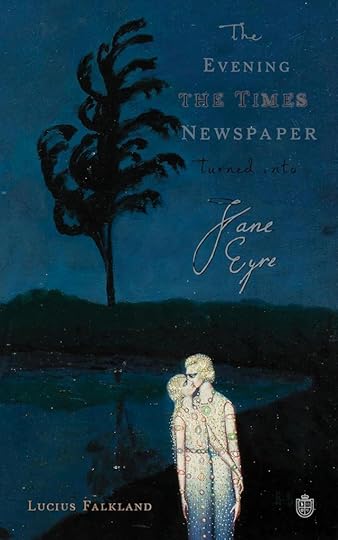
My life had become like a broadsheet,
The Telegraph, maybe The Times:
The financial section—prose sober and neat;
Inflation—the yen falls and climbs.
While reading this daily, and ever more jaded,
By boring discussions of wages,
My newspaper tore, the ink quickly faded:
You ripped your way up through the pages.
The suits on the concourse at Waterloo Station
All noticed my joy and my fright.
My Times underwent a divine transformation
Like someone regaining his sight.
You stood by the clock where they waited for trains,
Familiar, reserved, but with flair.
My journal of record? It went up in flames:
In a flash, I was reading Jane Eyre.
My feelings, so dulled by SSRIs
And age with the wealth of a hovel,
Without any warning felt very alive;
I was suddenly part of a novel.
My wife was now Bertha, enraged in the attic,
Your boyfriend was St. John, I guess.
Attraction was instant, inspiring, emphatic:
This burgundy-nailed governess.
The prose promptly altered: transcendent, noetic,
No longer the stark black and white;
Facts, figures, but beauty so very poetic:
A sunset one Thornfield Hall night.
I’m not quite as brooding as him, that I’m sure,
And you’re not as serious or neat.
The Times had become such a hideous bore,
All it took was for us two to meet.
Within half an hour we both felt so certain
But English restraint and control
Meant it took time to say we were clearly one person,
Each making the other one whole.
I’ve accepted my life’s not The Times but Jane Eyre
And in Brontë my future I’ll find.
Let’s hope if this moves beyond an affair
I don’t get myself burnt and go blind.
*****
Lucius Falkland writes: “This poem (first published in The Society of Classical Poets) recalls how my sometime paramour and I first met and very quickly felt that we had encountered ourselves in each other. Due to the large age gap, her friend referred to me as Mr Rochester, from Jane Eyre. This is how we started referring to each other. Her boyfriend also became known as St John thereafter. It also tries to capture the feeling, when you are deeply in love, that life seems fateful and inherently profound, as though you are just a character in a novel written by someone else. The jocular tone attempts to encapsulate the joy and absurdity of the experience.”
Lucius Falkland is the nom de plume of a writer and academic originally from London. His first poetry volume, The Evening The Times Newspaper Turned Into Jane Eyre, was published in 2025 with Exeter House Publishing. It can be purchased here.
June 16, 2025
Iambic heptameter: Simon MacCulloch, ‘Jasmina’

Jasmina is the doorway, Jasmina is the key;
Jasmina walks the path beside the pearl-infested sea.
The angels peer bewildered from the god-infested sky;
Jasmina is the only how that doesn’t need a why.
I see her in the morning in her robe of melting frost;
She visits me at noontime when the meaning has been lost.
At evening she invades the nooks the spiders thought their own
Till night demands a moon; she stoops, and hurls it like a stone.
I used to think her complicated, now I know she’s not
(A how that doesn’t need a why has little use for what).
I used to think she’d care for me, if only for a while;
I used to think a lot of things before I saw her smile.
I never hear her speaking though I think she has a song
Which many claim to know although they always get it wrong.
She feels like furry gossamer and tastes like perfumed smoke;
I often hear her laughter but I never learn the joke.
Jasmina is a destiny, Jasmina is a doom;
Jasmina is a woman but with stars within her womb.
The demons peer demented from their hope-infested hell
And beg her for a story, but she hasn’t one to tell.
*****
Simon MacCulloch writes: “Jasmina is a slightly offbeat take on the great western goddess motif (Aphrodite, the Virgin Mary etc). It is not based on anyone I know.”
Simon MacCulloch lives in London and contributes poetry to a variety of print and online publications, including Reach Poetry, View from Atlantis, Pulsebeat Poetry Journal, Spectral Realms, Black Petals and others. Jasmina was originally published in Blue Unicorn.
Photo: “mask” by new 1lluminati is licensed under CC BY 2.0.
June 14, 2025
Susan Jarvis Bryant, ‘Once Upon a Tortured Trope’
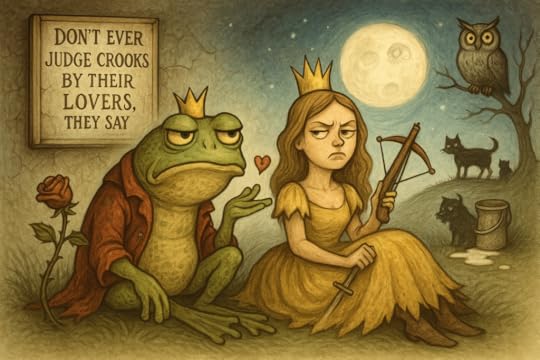
Don’t ever judge crooks by their lovers, they say
On book covers nailed to the wall.
The frog sends his kiss at the bend of the day
To Belle who is beast of the ball.
As tough as a cucumber, cool as old boots,
An untroubled damsel of flair
Is shooting for stars. When the pussy-owl hoots
She snares a short prince with blonde hair.
They sail inky skies on a silver-lined dream
To greener scenes up in the hills.
But honey and moons aren’t as sweet as they seem
When cats and dogs reign and milk spills.
His rose bears a thorn and his shoulder, a chip.
Hyenas have stolen his laughter.
All charm hits the skids as she grapples to slip
The grip of his gripe ever after.
*****
Susan Jarvis Bryant writes: “I really don’t have anything to say about the poem, other than I had huge fun writing it. It’s the same with all of my poems – I never suffer for my art, which makes me reluctant to call myself a poet. I’d like to say I write my poems in a tearstained, whisky-soaked haze while my Muse tangos with the ghost of Dylan Thomas through Welsh valleys, but this is not so. I just snigger away as the ink flows like a bad comedienne laughing at her own jokes.”
‘Once Upon a Tortured Trope’ was originally published in Snakeskin.
Susan Jarvis Bryant is originally from the U.K. and now lives on the coastal plains of Texas. Susan has poetry published on The Society of Classical Poets, Lighten Up Online, Snakeskin, Light, Sparks of Calliope, and Expansive Poetry Online, The Road Not Taken, and New English Review. She also has poetry published in The Lyric, Trinacria, and Beth Houston’s Extreme Formal Poems and Extreme Sonnets II anthologies. Susan is the winner of the 2020 International SCP Poetry Competition and was nominated for the 2022 and 2024 Pushcart Prize. She has published two books – Elephants Unleashed and Fern Feathered Edges.
Art: AI + RHL
June 13, 2025
Sonnet: Juleigh Howard-Hobson, ‘What a Shame Spell’

To ruin anyone’s potential, you
Will need things like this: shell from a chicken’s
Egg that broke when it fell from its nest to
The ground, unhatched. Unfastened safety pins
That were found, not bought. Seeds, germinated,
Then boiled before the first leaves unfurled and
Turned green. Dead caterpillars. Negated
Contracts. Unopened catalogues. A hand
From a working clock. Beads from a wedding
Dress that was returned. At least one item
Must have been stolen from your target. Bring
These together, dig a 6 foot hole, then
Bury them. As you bury, state the name
Of who you want ruined, adding: ‘What a shame’.
*****
Juleigh Howard-Hobson writes: “This wicked sonnet was inspired by jealous fairytale stepmothers, and characters like Daphne Du Maurier’s Mrs. Danvers. Oh, and coming upon a bunch of dead green caterpillars lying under a tree… Besides first appearing in Coffin Bell, it is included in my book, Curses, Black Spells and Hexes: a Grimoire Sonnetica (Alien Buddha). Of all the spell sonnets I’ve written, this is one of the wryest. I wouldn’t wish it on my worst friend.”
Juleigh Howard-Hobson’s work can be found in Think Journal, Able Muse, New Verse Review, Coffin Bell Magazine (including this poem), The Deadlands, Autumn Sky Poetry and other venues. She has been nominated for “The Best of the Net”, Pushcart, Elgin & Rhysling Awards. A member of the HWA and the SFPA, she lives on the coast of the Pacific Northwest. In a poetically haunted house.
X: poetforest
“Try Digging A Whole On the Big Island” by Tommys Surfshack is licensed under CC BY 2.0.
June 11, 2025
Sonnet: Marion Shore, ‘Embarking’

Despite the dream and yearnings that lie drowned,
the flotsam of desire, the fearful straits,
the capsized hope, the passion gone aground,
the tides too treacherous to navigate,
you lift your gaze each time love reappears
like an ocean liner gliding through the dark,
without a thought you rush down to the pier
and climb aboard and once again embark,
and stand upon the deck ablaze with light,
and raise your glass beneath the glittering stars,
and watch the harbor slowly fade from sight,
not caring where you’re going, or how far —
knowing the odds are slim that you’ll survive,
yet never having felt quite so alive.
*****
Marion Shore writes: “Embarking is a riff on Petrarch’s sonnet Passa la nave mia colma d’oblio (Canzoniere 189), contrasting the festive departure of the ocean liner into the unknown, with the inevitable shipwreck of Petrarch’s beleaguered vessel. You could say “Embarking“ is sort of a prequel to Petrarch’s poem–with a hint of Titanic thrown in.”
Marion Shore is the author of For Love of Laura: Poetry of Petrarch, a collecion of Petrarch’s poetry in translation published by the University of Arkansas Press in 1987. Her work has also appeared in Poems from Italy; Petrarch in English; 150 Contemporary Sonnets; and Rhyming Poems: A Contemporary Anthology. Her poems and translations have been published in numerous journals including The Formalist, Light Quarterly, Iambs and Trochees, First Things, and Measure. Recipient of the 2010 Richard Wilbur Award for Sand Castle (from which this poem is taken) and two-time winner of the Howard Nemerov Sonnet Award, she lives in Springfield, MA.
Photo: “Berlin Cruise liner docked at Waterford” by mike65ie is licensed under CC BY-NC-SA 2.0.
June 9, 2025
Odd poem: Tchaikovsky, ‘Lilies of the Valley’
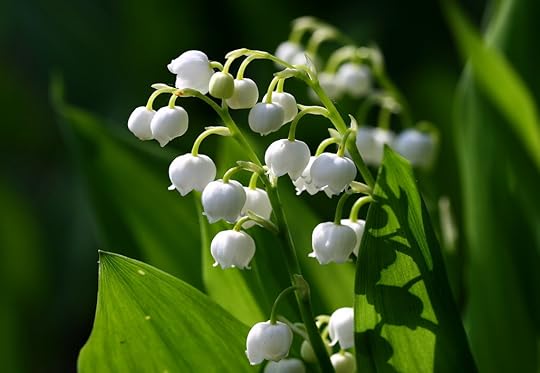
When at the end of spring I pick for the last time
My favourite flowers— a yearning fills my breast,
And to the future I urgently appeal:
Let me but once again look upon the lilies of the valley.
Now they have faded. Like an arrow the summer has flown by,
The days have grown shorter. The feathered choir is still,
The sun more charily grants us its warmth and light,
And already the wood has laid its leafy carpet.
Then when harsh winter comes
And the forests don their snowy cover,
Despondently I roam and wait with new yearning
For the skies to shine with the sun of spring.
I find no pleasure in books, or conversation,
Or swift-rushing sledges, or the ball’s noisy glitter,
Or Patti, or the theatre, or delicate cuisine,
Or the quiet crackling of smouldering logs on the fire
I wait for spring. And now the enchantress appears,
The wood has cast off its shroud and prepares for us shade,
And the rivers start to flow, and the grove is filled with sound,
And at last the long-looked-for day is here!
Quick to the woods!—I race along the familiar path.
Can my dreams have come true, my longings be fulfilled?—
There he is! Bending to the earth, with trembling hand
I pluck the wondrous gift of the enchantress Spring.
O lily of the valley, why do you so please the eye?
Other flowers there are more sumptuous and grand,
With brighter colours and livelier patterns,
Yet they have not your mysterious fascination.
Where lies the secret of your charms? What do you prophesy to the soul?
With what do you attract me, with what gladden my heart?
Is it that you revive the ghost of former pleasures,
Or is it future bliss that you promise us?
I know not. But your balmy fragrance,
Like flowing wine, warms and intoxicates me,
Like music, it takes my breath away,
And like a flame of love, it suffuses my burning cheeks.
And I am happy while you bloom, modest lily of the valley,
The tedium of winter days has passed without a trace,
And oppressive thoughts are gone, and in my heart in languid comfort
Welcomes, with you, forgetfulness of trouble and woe.
Yet now you fade. Again in monotonous succession
The days will begin to flow slowly, and stronger than before
Will I be tormented by importunate yearning,
By the agonizing dream of the happiness of days in May.
And then someday spring again will call
And raise the living world out of its fetters.
But the hour will strike. I shall be no more among the living,
I shall meet, like everyone, my fated turn.
And then what?—Where, at the winged hour of death,
Will my soul, heeding its command, soundlessly soar?
No answer! Be silent, my restless mind,
You cannot guess what eternity holds for us.
But like all of nature, drawn by our thirst to live,
We call to you and wait, beautiful Spring!
The joys of earth are so near to us, so familiar—
The yawning maw of the grave so dark!
*****
Lilies of the Valley (Ландыши) is a poem written by Pyotr Ilyich Tchaikovsky in December 1878 while he was in Florence.
“I am terribly proud of this poem”, he wrote when enclosing a copy to his brother Modest. “For the first time in my life I have managed to write a fairly good poem, which moreover is deeply heartfelt. I assure you that although it was very difficult, still I worked on it with the same pleasure as I do on music.”
Когда в конце весны последний раз срываю
Любимые цветы, – тоска мне давит грудь,
И к будущему я молитвенно взываю:
Хоть раз еще хочу на ландыши взглянуть.
Вот отцвели они. Стрелой промчалось лето,
Короче стали дни, умолк пернатый хор,
Скупее солнце нам дает тепла и света,
И разостлал уж лес свой лиственный ковер.
Потом, когда придет пора зимы суровой
И снежной пеленой оденутся леса,
Уныло я брожу и жду с тоскою новой,
Чтоб солнышком весны блеснули небеса.
Не радуют меня ни книга, нибеседа,
Ни быстрый бег саней, ни бала шумный блеск,
Ни Патти, ни театр, ни тонкости обеда,
Ни тлеющих полен в камине тихий треск.
Я жду весны. И вот волшебница явилась,
Свой саван сбросил лес и нам готовит тень,
И реки потекли, и роща огласилась,
И наконец настал давно желанный день!
Скорее в лес!.. Бегу знакомою тропою:
Ужель сбылись мечты, осуществились сны?..
Вот он! Склонясь к земле, я трепетной рукою
Срываю чудный дар волшебницы-весны.
О ландыш, отчего так радуешь ты взоры?
Другие есть цветы роскошней и пышней,
И ярче краски в них, и веселей узоры, —
Но прелести в них нет таинственной твоей.
В чём тайна чар твоих? Что ты душе вещаешь?
Чем манишь так к себе и сердце веселишь?
Иль радостей былых ты призрак воскрешаешь!
Или блаженство нам грядущее сулишь?
Не знаю. Но меня твоё благоуханье,
Как винная струя, и греет и пьянит,
Как музыка, оно стесняет мне дыханье
И, как огонь любви, питает жар ланит.
И счастлив я, пока цветешь ты, ландыш скромный,
От скуки зимних дней давно прошел и след,
И нет гнетущих дум, и сердце в неге томной
Приветствует с тобой забвенье зол и бед.
Но ты отцвел. Опять чредой однообразной
Дни тихо потекут, и прежнего сильней
Томиться буду я тоскою неотвязной,
Мучительной тоской о счастье майских дней.
—
И вот когда-нибудь весна опять разбудит
И от оков воздвигнет мир живой.
Но час пробьет. Меня – среди живых не будет,
Я встречу, как и все, черед свой роковой.
Что будет там?.. Куда, в час смерти окрыленный,
Мой дух, веленью вняв, беззвучно воспарит?
Ответа нет! Молчи, мой ум неугомонный,
Тебе не разгадать, чем вечность нас дарит.
Но, как природа вся, мы, жаждой жить влекомы,
Зовем тебя и ждем, красавица весна!
Нам радости земли так близки, так знакомы,-
Зияющая пасть могилы так темна!
English translation reproduced from Alexander Poznansky, Tchaikovsky. The quest for the inner man (1993), p. 336-337. https://creativecommons.org/licenses/by-nc-sa/4.0/
Photo: “lily of the valley” by Muffet is licensed under CC BY 2.0.
June 7, 2025
Semi-formal poem: Susan de Sola, ‘Bounty’
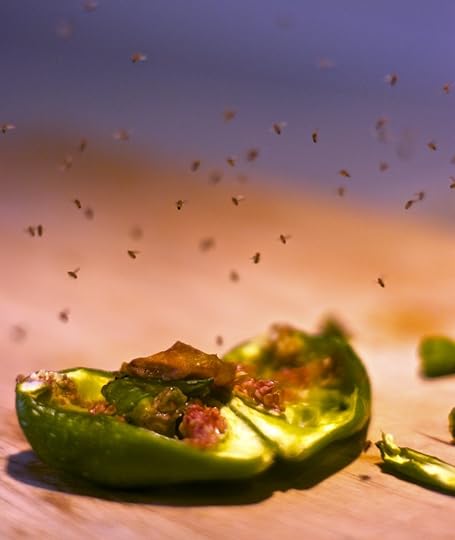
The fruit flies find our fruit, they slip
beneath the lid, a silver dome.
The dark fruit scent has drawn them in,
no other lures them out again.
They settle on apples, puckered figs,
they gorge in perpetuity,
may never fly back to their home,
(if they have ever had a home).
An allegory of choice? Well, yes–
in that we have no choice.
The fruit is fine, the day is long.
Let us feed, buzz, rejoice.
*****
Susan de Sola was a native New Yorker who earned a PhD in English Literature at Johns Hopkins, took a job at Amsterdam University… and stayed, married, raised five children. Published in the Hudson Review, PN Review, and The Dark Horse, she won the David Reid Poetry Translation Prize and the Frost Farm Prize. Her less serious work appeared in Snakeskin, Light, Lighten Up Online, and a couple of her poems were reprinted in Potcake Chapbooks. She was widely loved for her creativity, warmth, and sense of fun. She died from lymphoma in 2021, age 59.
‘Bounty’ is the final poem in her only published collection, Frozen Charlotte, published by Able Muse Press in 2019.
Photo: “Fruit flies from fig” by Alejandro Erickson is licensed under CC BY-NC-SA 2.0.
June 6, 2025
‘Maz’ Griffiths, ‘Clogs’

The Queen Mum’s gorn and popped her clogs;
the telly’s stuffed with Royal progs.
I’ve heard a thousand epilogues
now the old Queen Mum has popped her clogs.
The Queen Mum’s gorn and popped her clogs
so let’s fish out our mourning togs
and toast her name in small eggnogs.
Our dear old Queen Mum’s popped her clogs.
The Queen Mum’s gorn and popped her clogs.
Oh, Gawd, we’ll all go to the dogs,
and princes will turn into frogs
now the old Queen Mum has popped her clogs.
*****
The always delightful Margaret Ann “Maz” Griffiths published in a huge range of voices: formal sonnets of wildlife and of the illness that finally killed her, blank verse rants against warfare or injustice, sad songs of the female loss of innocence, flippant anti-establishment sarcasm about the British Royal Family…
‘Grasshopper’, her 350-page collection of poetry (and also one of her nicknames) was assembled by fans after her death and published by Arrowhead Press in the UK and Able Muse Press in North America. It is readable and rereadable. I post the occasional poem in this blog.
Photo: “Queen Mum Dead” by Joe Shlabotnik is licensed under CC BY-NC-SA 2.0.
June 4, 2025
Stephen Edgar, ‘Dawn Solo’
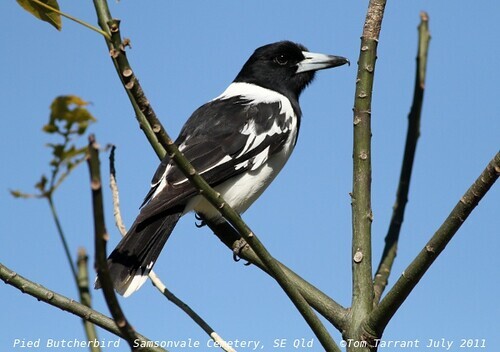
First light beside the Murray in Mildura,
Which like a drift of mist pervades
The eucalypt arcades,
A pale caesura
Dividing night and day. Two, three clear notes
To usher in the dawn are heard
From a pied butcherbird,
A phrase that floats
So slowly through the silence-thickened air,
Those notes, like globules labouring
Through honey, almost cling
And linger there.
Or is it that the notes themselves prolong
The time time takes, to make it stand,
Morning both summoned and
Called back by song.
*****
Stephen Edgar writes: “This poem needs little comment, I think. The bird in question is the pied butcherbird, as the poem says, considered by some to have the most beautiful song of any Australian bird. Let me quote some field guides to Australian birds: “superb, slow, flute-like mellow notes”; “song is one of our finest: a varied sequence of pure fluty whistles, sometimes interspersed by throaty warbles”; “fluted, far-carrying notes that seem to reflect the loneliness of its outback haunts”. Perhaps that third quotation best suggests the quality I was trying to capture. The notes seemed to be in slow motion, slowing time. I was attending the Mildura Writers’ Festival. Mildura is on the southern bank of the Murray River in northwestern Victoria. This was the first occasion on which I had heard the pied butcherbird.
“The form is a quatrain rhyming ABBA, with lines progressively shortening from pentameter, though tetrameter, trimeter to dimeter. It was first published in Australian Book Review and then in my twelfth book The Strangest Place: New and Selected Poems (Melbourne, Black Pepper, 2020), which is available on the Black Pepper website.”
Stephen Edgar was born in 1951 in Sydney, where he grew up. From 1971 to 1974 he lived in London and travelled in Europe. On returning to Australia he moved with his then partner to Hobart, Tasmania, where he attended university, reading Classics, and later working in libraries. Although he had begun writing poetry while still at high school, it was in Hobart that he first began writing publishable poems and found his distinctive voice. He became poetry editor of Island Magazine from 1989 to 2004. He returned to Sydney in 2005. He is married to the poet Judith Beveridge.
He has published thirteen full collections: Queuing for the Mudd Club (1985), Ancient Music (1988), Corrupted Treasures (1995), Where the Trees Were (1999), Lost in the Foreground(2003), Other Summers (2006), History of the Day (2006), The Red Sea: New and Selected Poems (2012), Eldershaw (2013), Exhibits of the Sun (2014), Transparencies (2017), The Strangest Place: New and Selected Poems (2020) and Ghosts of Paradise (2023). A small chapbook, Midnight to Dawn, came out in 2025, and a new collection, Imaginary Archive,will be published in late 2025. His website is www.stephenedgar.com.au, on which publication details of his books, and where they can be purchased, are given.
He was awarded the Australian Prime Minister’s Award for Poetry in 2021 for The Strangest Place.
Photo: “Pied Butcherbird (Cracticus nigrogularis)” by aviceda is licensed under CC BY-NC-SA 2.0.
June 2, 2025
Blank verse: Gail White, ‘Eve Discusses Adam’s First Wife’
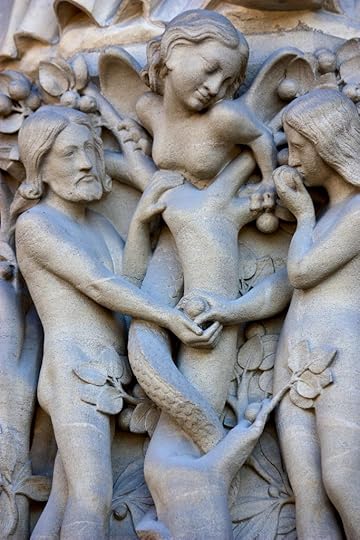
You tell me Lilith has become a fiend,
a vampire, a screech-owl, one who preys
on children (I‘ve had three and she has none),
sentenced for disobedience to run wild,
hideous now, howling for all she lost.
You tell me I was taken from your side
that I might always find a refuge there,
a warm and nestling creature like the cat,
safe from the free but haunted world of dark.
And I’ve adjusted splendidly, I think.
My apple fritters are the best you’ll eat,
go where you will. I keep domestic life
tidy and clean. I never stir abroad
for fear of Lilith’s shriek and bat-like wings.
Yet when our first son killed our second son,
I – the good mother and obedient wife –
had one quick moment’s envy of her life.
*****
Gail White writes: “You won’t find the story of Lilith in Genesis, but in later Jewish commentary. She was created simultaneously with Adam – God made them out of mud – and she used this joint creation to claim equality with him. The world was not ready for Lilith as First Feminist. She was banished, and Eve was created within Eden and presumed to be more docile. I tried to give her a little flash of independent thought.”
First published in Blue Unicorn.
Gail White lives in the Louisiana bayou country with her husband and cats. Her latest chapbook, Paper Cuts, is available on Amazon, along with her books Asperity Street and Catechism. She appears in a number of anthologies, including two Pocket Poetry chapbooks and Nasty Women Poets. She enjoys being a contributing editor to Light Poetry Magazine. Her dream is to live in Oxfordshire, but failing that, almost any place in Western Europe would do.
Photo: “Adam and Eve (and Lilith, the serpent) (Notre Dame, Paris, France)” by runintherain is licensed under CC BY-NC-SA 2.0.



